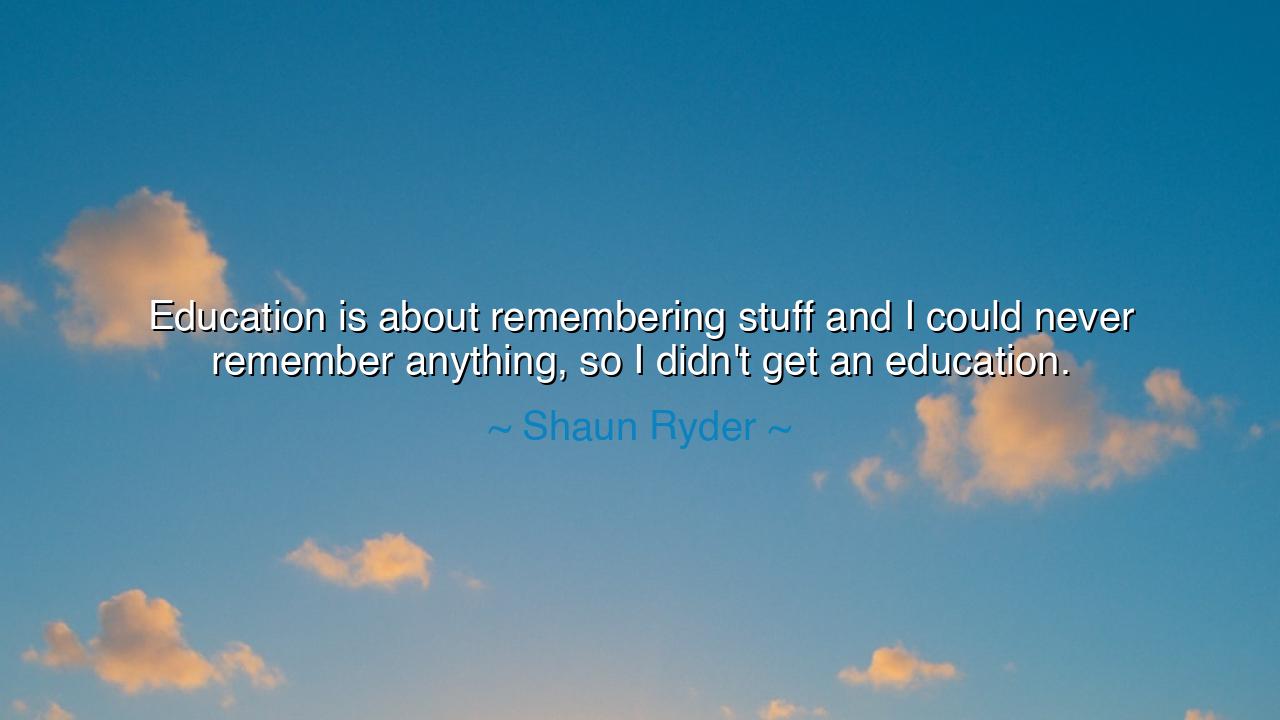
Education is about remembering stuff and I could never remember
Education is about remembering stuff and I could never remember anything, so I didn't get an education.






Shaun Ryder, a singer who lived as much in rebellion as in rhythm, once said: “Education is about remembering stuff and I could never remember anything, so I didn’t get an education.” Though spoken with blunt honesty, these words uncover a truth about the way society often mistakes the essence of learning. Too often, schools equate education with memory, and those who struggle to memorize are deemed failures. Yet true wisdom is not rote recollection but understanding, creativity, and the ability to shape one’s own path in life. Ryder’s lament is the cry of many souls who found themselves misjudged by systems that measured memory but overlooked imagination.
The origin of his quote lies not in philosophical discourse but in personal struggle. Ryder, the frontman of the Happy Mondays and a figure of Britain’s musical counterculture, openly spoke of his poor performance in school. He was branded as unfit for education because he could not conform to its rigid demands. But while he failed in classrooms, he flourished in the arts, proving that the inability to memorize facts does not mean the absence of intelligence or creativity. His life became a testament to the idea that learning has many forms, and education, when narrowly defined, risks crushing the very individuality it should nurture.
History echoes with similar stories. Consider Thomas Edison, who as a child was told by his teachers that he was “too stupid to learn anything.” His memory was poor, his attention wandered, and formal schooling rejected him. Yet he became one of the greatest inventors in history, not because of his ability to “remember stuff,” but because of his relentless curiosity and daring to experiment. Like Ryder, Edison’s story proves that the essence of education is not in memorizing, but in awakening the spirit of discovery.
Ryder’s words also serve as a critique of systems that reduce education to examinations. For what is the worth of memorizing endless dates, formulas, or lists if they do not kindle the fire of thought? When knowledge is treated as dead storage, it becomes a burden; when it is understood and applied, it becomes power. A system that rewards only those who can recall facts risks discarding the dreamers, artists, and visionaries—the very people who bring life to culture and progress to society.
Yet, in his lament, Ryder also reveals a wound: his sense of being denied the dignity of education. And this is tragic, for every human being deserves to taste the joy of learning, not as memorization but as awakening. The child who struggles with memory may yet have genius in their hands, in their voice, in their vision. If education fails to recognize this, it has failed in its highest mission—to draw out the gifts of the soul and allow each person to find their place in the great tapestry of life.
The lesson we must take is clear: we must redefine education. It is not the piling up of facts in the mind, but the cultivation of understanding, creativity, and character. Memory has its place, but it must serve wisdom, not replace it. We must honor diverse intelligences—artistic, practical, emotional, inventive—just as much as the ability to recall words from a book. To reduce education to memory is to deny the richness of human potential.
Practical action lies before us. Teachers must strive to see the unique strengths of each student. Parents must remind their children that failure in tests does not mean failure in life. Leaders must shape systems that reward curiosity and critical thinking, not just repetition. And each of us must remember, when we struggle to “remember stuff,” that we are not less capable of growth or greatness. For true education is not in the storage of knowledge but in the transformation of the soul.
Thus Shaun Ryder’s words, though wrapped in humor and bitterness, are a challenge for us all. Let us never forget: the goal of education is not to stamp out those who cannot memorize, but to awaken every person to their hidden light. For when learning is seen as life itself—not as memory, but as wisdom—then no one is left behind, and the true purpose of education is fulfilled.






AAdministratorAdministrator
Welcome, honored guests. Please leave a comment, we will respond soon